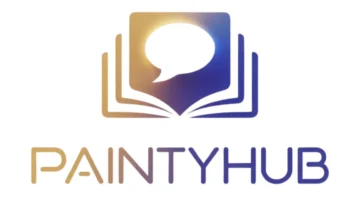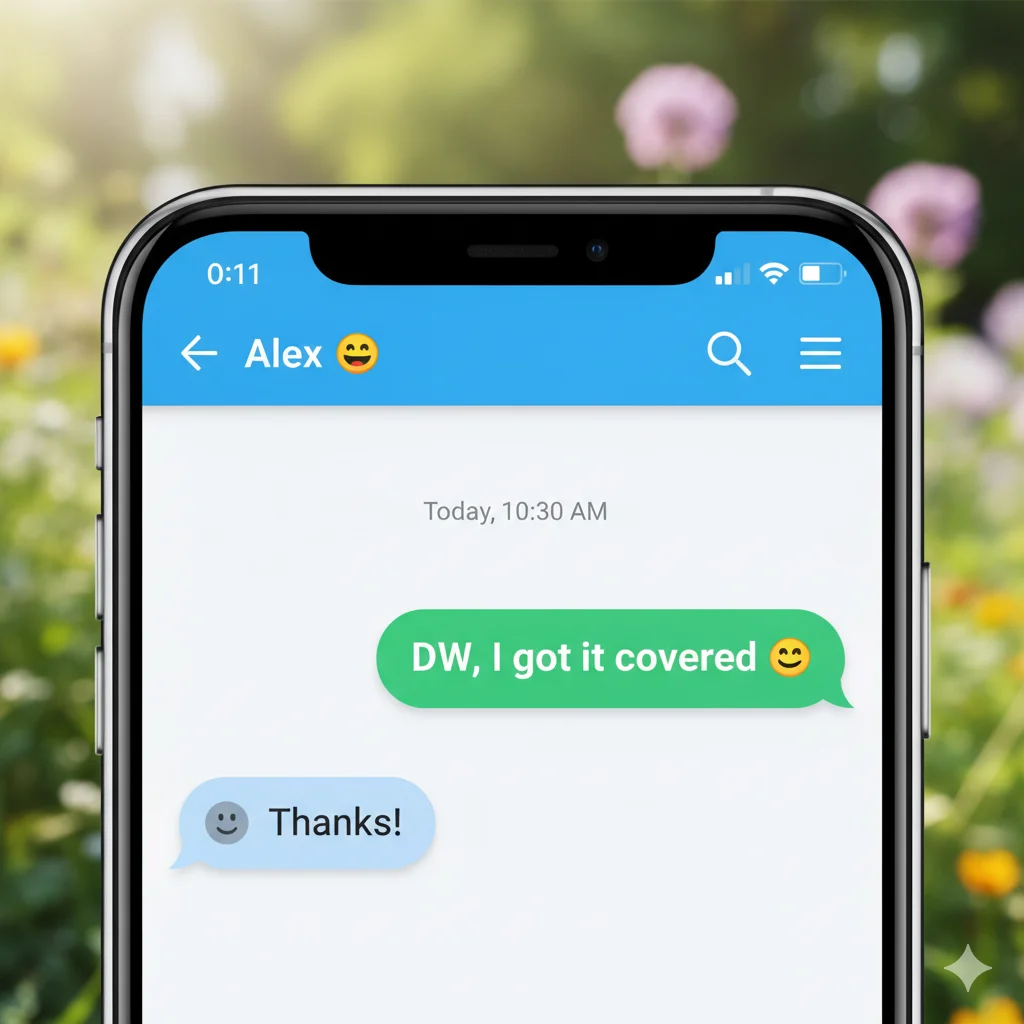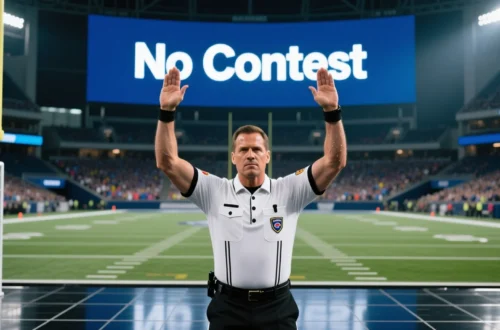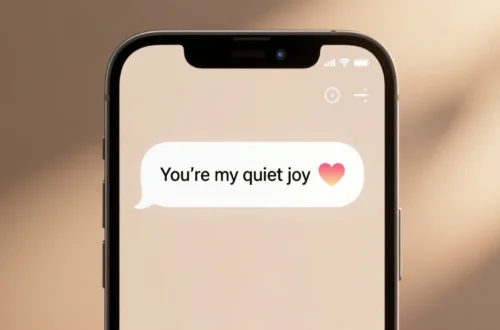Hey there, chat-lover 👋! Ever seen someone drop “DW” in a message and wondered what they meant? Maybe you typed something like:
“I forgot to bring the notes…”
“DW, I’ve got you.”
If you’re on apps like WhatsApp, Snapchat, Instagram, or gaming in Discord — and you want to stay on top of modern texting lingo — this post is for you. We’ll dig into what “DW” stands for, how people use it across chats and social media, and why it’s handy to know. Understanding these short forms helps you text more naturally, avoid confusion, and connect with others quicker. Without further ado — let’s unpack “DW” and how to use it like a pro.
Definition & Meaning
DW most commonly stands for “Don’t Worry.”
It’s a casual, friendly way to reassure someone — telling them that the situation is okay, there’s no need to stress.
Examples:
Friend: “I’m late again…”
You: “DW, we haven’t left yet.”
Here, “DW” = “Don’t worry.”
Another use:
Sibling: “I forgot to feed the dog.”
You: “DW, I’ll take care of it.”
In most cases, when someone types “DW,” they’re saying: “Relax — I’ve got it” or “It’s fine — no problem.”
Alternate meanings:
While “Don’t Worry” is the dominant meaning, “DW” can sometimes appear in other less common contexts — like “Dear Wife” in messages referencing a spouse.
Because of that, context matters.
Background & History
Short texting abbreviations exploded with the rise of online chatrooms, IM platforms such as AIM, Yahoo Messenger, and later apps like Snapchat and WhatsApp.
“DW” as “Don’t Worry” is part of that wave of shorthand aimed at speed and simplicity.
Over time, the initialism became standard in texting culture. It made its way into social-media chats, memes, comment threads, and gaming conversations. Because of its reassuring tone, it’s favored when someone’s made a mistake, is apologizing, or something minor went wrong.
Usage in Various Contexts
Here’s how you’ll see “DW” used across different settings:
Texting & Messaging
You: “I forgot the tickets 😬”
Friend: “DW, I already printed them.”
Social Media / Comments
“Lost the game again… DW, next one for sure!”
Here “DW” signals it’s okay, no big deal.
Gaming / Online Chat
Teammate: “I died early — sorry!”
You: “DW, we can still win.”
In fast chat, “DW” keeps things light and supportive.
Casual Group Chat
Friend: “I messed up the playlist…”
You: “DW, we’ll just pick something else.”
Professional / Formal Settings
In work emails or formal conversations, avoid using “DW” casually. Instead say:
“Please don’t worry about this, I’ll handle it.”
“DW” remains too informal for many workplaces.
Common Misconceptions & Clarifications
- ❌ Misconception: “DW” always means “Don’t Worry” in all contexts.
✅ Actually: While that is the main meaning, in certain niche contexts it can mean other things (like “Dear Wife”). - ❌ Misconception: “DW” is appropriate in all settings.
✅ No — because it’s informal, in professional or serious communication it might sound too casual. - ✅ Clarify with context: If someone says “DW” after you’ve messed up, they’re likely trying to reassure. But if you see “DW” in a completely different topic (e.g., discussing spouses or slang outside chat) check meaning.
Similar Terms & Alternatives
Here are some related expressions you might see:
| Term | Meaning | Tone |
|---|---|---|
| DW | Don’t Worry | Casual, reassuring |
| NW | No Worries | Friendly, laid-back |
| NP | No Problem | Acknowledgement, casual |
| It’s okay | Full phrase | Neutral, a bit more formal |
So if you don’t want to use “DW,” you can use “NW” or “No problem” depending on tone and context.
How to Respond to “DW”
When someone uses “DW,” your response can reflect gratitude, acceptance, or just acknowledgement.
Casual response:
Friend: “DW, I’ve booked the transport.”
You: “Thanks! You rock.”
Funny response:
Friend: “DW about the snacks.”
You: “Cool — you’ll pay for round two then 😂.”
Professional response:
Colleague: “DW, I’ll finish the draft by this afternoon.”
You: “Great, thank you for handling that.”
Privacy-conscious response:
If you’re not comfortable with the informality:
You: “Thanks for that. I appreciate it.”
This keeps things polite while avoiding too casual slang.
Regional or Cultural Differences
“DW” is widely used in English-speaking online communities — the U.S., UK, Canada, Australia. But its prevalence can vary:
- In regions where texting abbreviations aren’t as common, “DW” might be less used or understood.
- Among older generations, you may find fewer people use “DW” and may instead write the full phrase “Don’t worry.”
- In multilingual chats, people might confuse “DW” with other local abbreviations, so clarity is key.
Comparison with Similar Terms
Here’s a quick table to see how “DW” stacks up:
| Abbreviation | Meaning | Typical Context |
|---|---|---|
| DW | Don’t Worry | Friendly reassurance in chat |
| NW | No Worries | Similar feel, slightly more relaxed |
| NP | No Problem | Acknowledging a favour or fix |
| IDK | I Don’t Know | Unrelated, but same chat-abbrev style |
Usage in Online Communities & Dating Apps
On platforms like Tinder or Bumble, someone might drop:
“Sorry I missed your message.”
“DW, all good 😊”
Here, “DW” helps in keeping things light and friendly.
In gaming, chat rooms or forums, it shows up when someone’s made a small error or is apologising:
“Lag messed me up, dw I’ll catch up.”
Because these platforms favour quick replies, “DW” fits well.
Hidden or Offensive Meanings
Good news — generally, “DW” does not carry offensive meanings. It’s simply informal and reassuring.
However:
- If used in a serious situation where more empathy is needed, “DW” can feel dismissive.
- In some domains (legal, medical, formal communications), “DW” may come across as too casual or flippant.
So always consider tone and context.
Suitability for Professional Communication
In emails, formal messages or workplace chats, it’s best to avoid “DW.”
Instead use full expressions:
- “Please don’t worry about that.”
- “I’ve got it handled.”
- “We’ll take care of it.”
Using “DW” in these contexts may reduce clarity or appear informal.
FAQs
1. What does DW mean in a text message?
→ “Don’t Worry” — a quick way to reassure someone.
2. Is DW the same as “NW” or “NP”?
They’re related: “NW” means “No Worries,” “NP” means “No Problem.” “DW” specifically means “Don’t Worry.”
3. Can “DW” mean something else?
Yes — in rare contexts it can mean “Dear Wife,” or refer to things like Doctor Who (“DW” in fandom), but those are niche.
4. Should I use “DW” in work emails?
Typically no — it’s informal and may not suit professional tone.
5. Is “DW” understood globally?
Mostly yes in English-speaking digital spaces, but in non-native English chats you may need to clarify.
Conclusion
To sum up — “DW” means “Don’t Worry”, a short and friendly way to ease concerns. It’s perfect for casual chats, social media, and relaxed communication. Just remember: keep it informal, use it among friends or in casual settings, and avoid it in formal or professional scenarios.
Next time someone messages you “DW,” you’ll know exactly how to respond with confidence. 👍






